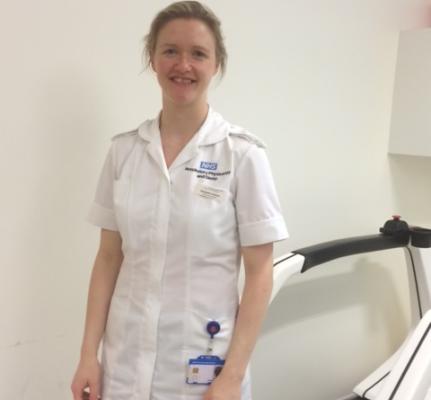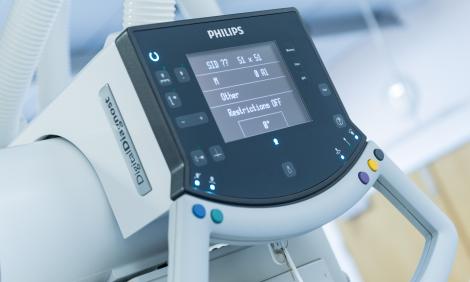Respiratory physiology and sleep sciences
Respiratory physiology and sleep science involves the diagnosis and treatment of lung disease and sleep disorders.
Patients may have been referred for a wide variety of reasons, including:
- chest pains
- abnormal chest x-rays
- breathing difficulties
- respiratory disease
- sleep breathing disorders or other sleep disorders.
Working life
Your role will depend on the area of respiratory physiology and sleep science you’re working in.
Respiratory physiology
In respiratory physiology, you’ll work with patients who have lung, chest wall, airway or blood oxygenation problems to understand the causes of their disorder and the response to and monitoring of treatment.
Respiratory disorders include conditions such as:
- asthma
- fibrosis
- emphysema
- respiratory muscle disease
- pulmonary vascular disorders
You’ll work with patients by performing tests using a variety of skills, techniques and equipment, while they are at rest or during exercise. You might also help patients in the delivery of their long-term treatment and care, such as oxygen, ventilation or their medication. Tests often require considerable encouragement, technical accuracy and quality and at the same time a caring approach.
Sleep physiology
In sleep physiology, you’ll work specifically with patients who have problems of poor sleep quality. You will be treating conditions such as obstructive sleep apnoea, where people stop breathing because they collapse the airway in their throat when they are asleep. You will monitor patients – often using home monitoring but sometimes in a sleep laboratory - to help identify individual problems, which require treatment and long-term management.
The range of tests that you would perform include:
- full cardio-pulmonary exercise testing
- sleep studies
- bronchial challenge testing
- measurements of dynamic and static lung volumes
- respiratory gas exchange
- muscle function studies
- blood gas analysis
- responses to treatment
- allergy testing
- physiological response to exercise
You’ll be responsible for ensuring that safe, accurate, reliable and repeatable results are produced as often patients live or their treatments depend on these.
Lizzie Dobson
Trainee clinical scientist (respiratory physiology and sleep)
Read Lizzie's storyThe best thing is that my job is patient-facing most of the time and I learn new things every day.

Who will I work with?
As a member of healthcare science staff in respiratory physiology and sleep sciences, you’re likely to work in a team that includes specialist nurses, doctors specialising in respiratory and/or sleep medicine, physiotherapists and other healthcare science staff, such as those specialising in cardiac sciences and neurophysiology.
Want to learn more?
-
Most jobs in the NHS are covered by the Agenda for Change (AfC) pay scales. This pay system covers all staff except doctors, dentists and the most senior managers. As a healthcare science practitioner, you’d usually start on band 5, with opportunities to progress to more senior positions. Trainee clinical scientists train at band 6 level, and qualified clinical scientists are generally appointed at band 7. With experience and further qualifications, including Higher Specialist Scientist Training, you could apply for posts up to band 9.
Staff will usually work a standard 37.5 hours per week. They may work a shift pattern.
Terms and conditions of service can vary for employers outside the NHS.
-
With further training or experience or both, you may be able to develop your career further and apply for vacancies in areas such as further specialisation, management or teaching.
Healthcare science staff often work at the forefront of research and innovation, so that patients are continually receiving the very best healthcare. In respiratory physiology, healthcare science staff are developing new techniques in transplanting of lungs from donors to recipients. The new treatment involves 'washing' donor organs by connecting them for several hours to a modified heart and lung bypass machine. The lungs are given oxygen and nutrients and treated with antibiotics to tackle infection. Excess fluid is also removed. This technique is known as ex-vivo lung perfusion.
-
Job market
The role of healthcare science staff working in respiratory physiology and sleep sciences is exciting and dynamic. With laboratory techniques constantly evolving, research within respiratory and sleep medicine is constantly advancing and the equipment becoming more specialised and high-tech, this is a challenging, motivating and ultimately rewarding career.
In November 2018, there were 6,123 clinical scientists registered with the Health and Care Professions Council.
The NHS Scientist Training Programme (STP) and Higher Specialist Scientist Training (HSST) attract many more applicants than there are places and so there is considerable competition for places.
Finding and applying for jobs
When you’re looking for job or apprenticeship vacancies, there are a number of sources you can use, depending on the type of work you’re seeking.
Check vacancies carefully to be sure you can meet the requirements of the person specification before applying and to find out what the application process is. You may need to apply online or send a CV for example.
For the STP and HSST there is an annual recruitment cycle and applications should be made through the National School of Healthcare Science's website, where you can also find information about the programmes and the recruitment process.
Key sources relevant to vacancies in the health sector:
- vacancies in organisations delivering NHS healthcare can be found on the NHS Jobs website
- opportunities in the Civil Service can be found on the Civil Service Jobs website
- vacancies in local government can be found on the Local Government Jobs website and the Jobs Go Public website
As well as these sources, you may find suitable vacancies in the health sector by contacting local employers directly, searching in local newspapers and by using the Universal Jobmatch tool.
Find out more about applications and interviews.
Volunteering is an excellent way of gaining experience (especially if you don’t have enough for a specific paid job you’re interested in) and also of seeing whether you’re suited to a particular type of work. It’s also a great way to boost your confidence and you can give something back to the community.
-
For further information about a career in respiratory physiology and sleep sciences, please contact:





